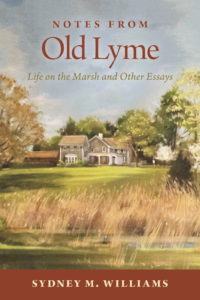 Another neighbor turns to words, to look at where and how we live.
Another neighbor turns to words, to look at where and how we live.
Sydney Williams, formerly of Smith’s Neck in Old Lyme and now of Essex, gives us an engaging and thoughtful autobiography and personal peregrination, in fits and starts (brief essays), leading us from Madison, CT and Peterborough, NH, to Massachusetts, New Hampshire again, the U.S. Army, Greenwich, CT, New York City and on to Old Lyme, with side excursions to California, Colorado and Austria.
It is, as he calls it, “a memory of mindfulness” stimulated by “time to think,” a great asset of old age!
Williams is ever humorous and self-effacing as he draws us into his history using “The Great Outdoors,” “The World at Large,” “Books” (he is a voracious reader and quoter), and “Family and Friends.”
His analogies pop up on almost every page. A marsh is a “cacophony” of sight and sound, creatures and vegetation. The sea “as calm as a toad in the sun.” That one reminds me of a recent haiku of my own:
October Reverie
Glistening green toad,
Snoozing on the hot tarmac:
Sound of tires ahead?
Often a subtle jab: “On occasion we have caught sight of weasels, which, while common in Washington, are rarely seen in our marsh.”
He apologizes for his longest essay (11 pages) of political musings in which he bemoans the excessive partisanship and incivility in today’s governmental climate, the “fiction” of representative government (he suggests term limits on all elected offices, especially those in Washington), and stresses “the importance of confronting differing opinions” with reason, candor, and civility. We live, he suggests, in “a world marked with uncertainty.”
Sydney Williams’s essays also stimulate personal reflections: I too have experienced education in New Hampshire (Concord vs. Durham), working the the bowels of New York City (I lasted but three years!), skiing at Vail, climbing Marin County’s Mt. Tamalpais, summers on the Jersey Shore (Mantoloking vs. Rumson), and residences in western and eastern Connecticut (Rowayton vs. Greenwich). But the most remarkable coincidence is that of rowing: Williams describes his paddling a single scull on the Lieutenant River, while I have rowed Hamburg Cove, the Connecticut River, Selden Creek, and Rogers Lake. He describes his rowing as being “almost Zen-like.” My car’s bumper sticker describes it as “kinetic meditation.”
He also refers to Yale’s Peabody Museum of Natural History, the subject of another Old Lyme writer, Richard Conniff, a review of whose House of Lost Worlds appeared on LymeLine.com on Aug. 22, 2016.
Read on, neighbors, and do check out Sydney Williams’s blog: www.swtotd@blogspot.om for his weekly observations.
Editor’s Note: ‘Notes, From Old Lyme: Life on the Marsh and Other Essays’ by Sydney M. Williams is published by Bauhan Publishing, Peterborough, NH 2016.

About the Author: Felix Kloman is a sailor, rower, husband, father, grandfather, retired management consultant and, above all, a curious reader and writer. He’s explored how we as human beings and organizations respond to ever-present uncertainty in two books, ‘Mumpsimus Revisited’ (2005) and ‘The Fantods of Risk’ (2008). A 20-year resident of Lyme, he now writes book reviews, mostly of non-fiction that explores our minds, our behavior, our politics and our history. But he does throw in a novel here and there. For more than 50 years, he’s put together the 17 syllables that comprise haiku, the traditional Japanese poetry, and now serves as the self-appointed “poet laureate” of Ashlawn Farms Coffee, where he may be seen on Friday mornings. His wife, Ann, is also a writer, but of mystery novels, all of which begin in a bubbling village in midcoast Maine, strangely reminiscent of the town she and her husband visit every summer.